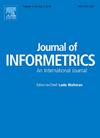深度学习与文献计量学的结合:引文函数分类调查
IF 3.5
2区 管理学
Q2 COMPUTER SCIENCE, INTERDISCIPLINARY APPLICATIONS
引用次数: 0
摘要
随着自然语言处理(NLP)方法的出现和发展,引文功能自动分类领域已变得越来越受欢迎,并为此做出了巨大的研究努力。自动引文功能分类具有计算语言学和文献计量学的共同背景。然而,由于这两个领域的专业知识不同,很少有对这一任务的全面统一分析。我们从引文功能标注方案、广泛使用的基准和计算模型等维度对引文功能分类任务的演变进行了详细而细致的研究分析。我们首先介绍了引文功能分类任务的起源和发展。然后,我们从多学科融合的角度,讨论了如何更好地将文献计量学与 NLP 结合起来,为引文功能分类任务做出贡献。最后,基于我们在任务中发现的不足,我们提出了文献计量学和近义词语言学中一些有待研究的前景。本文章由计算机程序翻译,如有差异,请以英文原文为准。
Deep learning meets bibliometrics: A survey of citation function classification
With the advent and progression of Natural Language Processing (NLP) methodologies, the domain of automatic citation function classification has gained popularity and considerable research efforts have been contributed to this task. Automatic citation function classification has a joint computational linguistic and bibliometrics background. However, due to the different expertise in both fields, there is rarely a comprehensive and unified analysis of this task. We provide a detailed and nuanced examination analysis of the evolution of citation function classification task from the dimensions of citation function annotation schemes, widely employed benchmarks, and computational models. We first present the origins and the development of the citation function classification task. From the perspective of multi-disciplinary integration, we then discuss how bibliometrics and NLP can be better combined to contribute to the citation function classification task. Finally, based on the deficiencies that we have found in the task, we suggest some promising prospects in both bibliometrics and NLP to be investigated.
求助全文
通过发布文献求助,成功后即可免费获取论文全文。
去求助
来源期刊

Journal of Informetrics
Social Sciences-Library and Information Sciences
CiteScore
6.40
自引率
16.20%
发文量
95
期刊介绍:
Journal of Informetrics (JOI) publishes rigorous high-quality research on quantitative aspects of information science. The main focus of the journal is on topics in bibliometrics, scientometrics, webometrics, patentometrics, altmetrics and research evaluation. Contributions studying informetric problems using methods from other quantitative fields, such as mathematics, statistics, computer science, economics and econometrics, and network science, are especially encouraged. JOI publishes both theoretical and empirical work. In general, case studies, for instance a bibliometric analysis focusing on a specific research field or a specific country, are not considered suitable for publication in JOI, unless they contain innovative methodological elements.
 求助内容:
求助内容: 应助结果提醒方式:
应助结果提醒方式:


